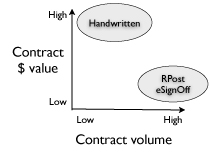
In a update briefing last week with Zafar Khan, CEO of RPost, the electronic signature and registered email company that I first blogged about in 2008 while at Lotusphere, the company described its introduction of a new product for electronic signatures.
I’ve been an enthusiast for digital signatures as popularized by the Public Key Infrastructure solutions from RSA or Entrust, blending strong cryptographic technologies with hash mechanisms for complete privacy, authentication, authorization, integrity and non-repudiation of communications. The pain has been the complexity, the infrastructure requirements and the discipline to use the technology regularly.
Many of these pains have been addressed by RPost. With a simple Outlook plugin button (or a simple email address extension where you send the message to [email protected] and the service performs the register value and delivers the message to [email protected]) delivers a receipt proving delivery, a document altering detection mechanism that proves content and a date-time stamping functionality for email messages called Registered Email. Registered Email allows for self-confirmation of authenticity, integrity (that no one changed the message in transit) and date-time stamps.
This service has been accepted by the US government, the insurance industry, the US courts since December 1, 2006 and many countries around the world as a definitive court-admissible mechanism for proving delivery, content and date-time of a communication. RPost has worked hard to enable the integration of their service in various high frequency business processes.
NOW, the company has expanded its offerings
Digital signatures are more than pixelation of your hand drawn signature. In fact, digital signatures are typically activated with a click of a mouse and involve a hash of the document, and public key encryption to activate software processes that are virtually impossible to replicate. The hash validates that the document being signed and the document in dispute have not changed. Digital signatures have been around for many years, but have not reached widespread usage in business or consumers due to user resistance. One of these factors of resistance is that digital signatures do not require the same or similar personalized drawing that is the written-on-paper signature we learn at an early age.
 RPost’s new service combines the digital advantages of the digital signature with the personalization aspects of the handwritten signatures. This way, users can assign the same emotional attachment to the process of digital signing as users assign to the process of analog signing ones name on paper.
RPost’s new service combines the digital advantages of the digital signature with the personalization aspects of the handwritten signatures. This way, users can assign the same emotional attachment to the process of digital signing as users assign to the process of analog signing ones name on paper.
Well, the new service, called eSignOff, lets users to send their Word, PDF, Excel or PowerPoint documents via email through the Outlook plugin or by sending the email to [email protected] for eSignOff processing. It then encapsulates the document and presents it via email to the signer who can type anywhere on the document to fill in forms and use their mouse to create a mouse-drawn simulation of their written signature. PKI completes the process with a digital signature binding all the digital benefits (non-repudiation, integrity, authentication, authorization and privacy) with the mouse-drawn signature.
As shown in the graphic, this new service is optimal for high frequency, but relatively low dollar volume items such as:
- Recording sign-off of email-based purchase orders
- Routine Non-Disclosure Agreements
- Insurance claims processing
- Recording sign-off of change orders or terms and agreements
- Notice & acceptance of amendments to contracts
- Signing and counter-signing employment contracts
- Signing acceptance of corporate policies
- Sarbanes-Oxley conformance commitments
- Official vendor-supplier communications
- Shareholder voting processes
Overall, this new service will accelerate acceptance of the digital signature making its technology more transparent and therefore improving user acceptance. For business process owners, particularly in high volume low dollar value contracts, the functionality greatly reduces paperwork while improving signee confidence in their work. eSignOff is the ‘missing link’ to enabling the frequent use of digital signature technologies in high volume contractual commitment. Introducing it at this time in our economic recovery can further improve productivity in complex businesses like insurance and processes like purchase orders and compliance certificates and move our economy forward.









